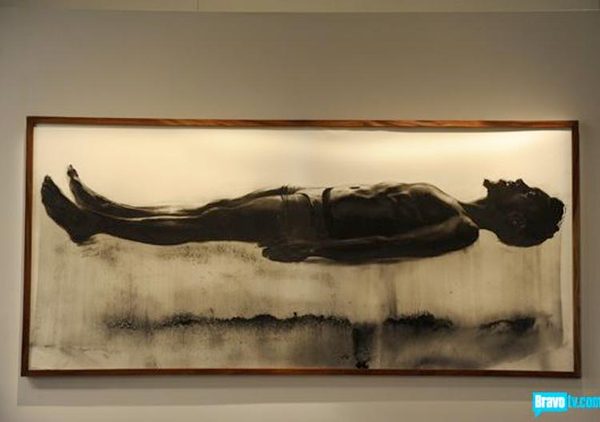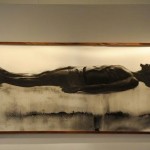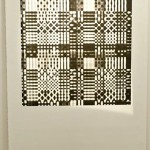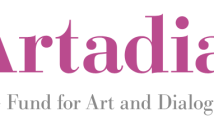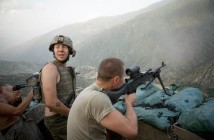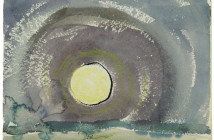So, Bravo's Work of Art is now over. In a short (and mindblowingly quick) 9 weeks we paid witness to wacky artists, crazy contests and even minor nudity. 14 artists of varying media and talent levels all sought to be America's top artist with us armchair artists critiquing, groaning, and sometimes cheering alongside them. But ultimately what did the show produce as a cultural artifact of our time? Sure, someone won. And that person will have a solo show at the Brooklyn Museum (barring a coup of the board of directors) and walk away with $100,000 courtesy of some art product/supply company. But will this program have a meaningful impact on art making or art perception? It is impossible to gauge just what the effect might have been on audiences. The ratings have been pretty average – not even close to Top Chef the current champion of reality challenge programming – but respectable. But did the show succeed?
I admit to watching the entire program. While not overly engaging at times I felt it was an interesting window into the art making process. It also provided an interesting perspective on the critiquing practice (or crit as they referred to it in a sly nod to insiders) as well. Now, I have already remarked upon how I feel about the judges and various contestants. How do I feel now that several weeks have passed and I've got a greater sense of them and how the program functions? The results for me were mixed. Some of the challenges seemed downright ridiculous (the public sculpture episode was quite painful to watch) and the way in which the participants were portrayed were clunky and heavy handed. It made me long for the subtleties of Real Housewives of Orange County. It seemed that at times the editors and producers were painting everyone with a rather broad brush. There was the beautiful woman who always got naked, the "crazy" OCD artist who manipulated and overacted, and the unfortunate untrained one who lamented his outsider status and who resorted to dismissive anti-intellectualism that left me with little sympathy for him.
In fact, it seemed to me that the producers intentionally bookended Eric Johnson and Miles Mendenhall in a ham handed attempt to foster reality TV "drama." It ultimately came across as mean spirited and neither artist benefited. This interaction leads me to my biggest disappointment with Work of Art. As an example of reality television it wasn't one. You may argue with me here but I do feel that done correctly a reality program can be a work of art. There is a skill that is required in the construction of this type of show. The best ones are seamless. They build a narrative arc. They create characters. This show seriously needs to step up its back end production skills because it was often infuriating to watch. Some crits made no sense and the conversations were so clunkily edited that I wanted to throw something at the screen on several occasions. As they are determined to make another season my first suggestion is to hire an editor who knows what they are doing. Come on, Sarah Jessica, I'm sure you know someone who owes you a favor.
Ok so, production-wise the show needs help. How about the artists? Overall I think they did a decent job of pulling together a diverse group. I think that some got the shaft far too early and some weren't cut early enough. It became quite clear that some of them just couldn't work outside of their comfort zone. Jamie Lynn Henderson's work was just painful and it quickly became clear that she couldn't think outside of her medium. A lot of the contestants This became evident as the program continued. Each challenge pushed the artists to beyond what they were accustomed to. I am conflicted about this. I think there are two sides at play here. There is the notion that the contemporary artist must be able to navigate multiple media. You must paint, draw, create an installation, take a photograph, etc. I understand this perspective. Is it true of everyone? Not at all. Some people can do this. Is this ability a necessity to succeed in the art world? I don't think so. Some people are very happy to work in one medium and be very good at it. But is this a prerequisite to becoming an art "superstar?"
Is that what they want to create? An art superstar? A brand? Ultimately I think so. What the program (and by extension reality television in general) is about creating celebrity. How this is accomplished and what path is taken is irrelevant. But in a way this is disingenuous. Certainly we can all name celebrity artists but are they in the same stature as mainstream ones? Does Julian Schnabel equal Lindsay Lohan? Well, perhaps that is too ridiculous a comparison but you see where I am going here. One can think of Takashi Murakami or Damian Hirst as brands and celebrity artists but the thought that winning a reality television program will elevate you to such a status is ludicrous. Perhaps the best way to think of this program is that is offers up visibility regardless of who wins. Sure, a solo show and a grand survey museum and a hundred grand is nothing to sneeze at but at the end of the day the person who was ejected early on, if their work is of a caliber that warrants it, also has a chance at making a career out of art. You can see this play out in the survivors of the Project Runway series. Many of them have their own fashion shows and boutiques. Just the added spritz of celebrity gives them a career boost that they might otherwise have not had. My thought is that at the end of the day why not audition to be a part of this program. If you make it on then have fun with it. It is ultimately a marketing tool and be smart enough to use them as much as they use you.
- Artwork by finalist (and winner) Abdi
- Artwork by finalist Peregrine
- Artwork by finalist Miles
Bravo's website for Work Of Art
All images are via the Bravo website.

